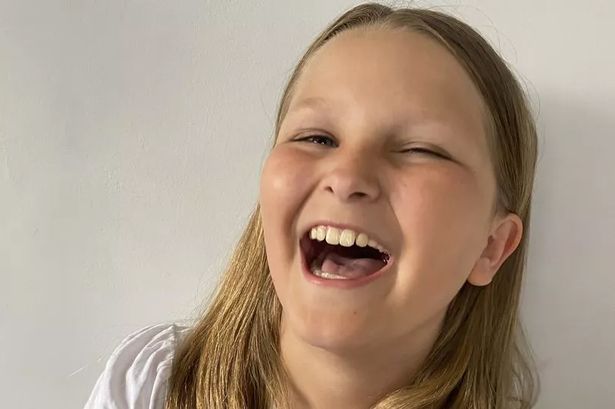Mia Lucas’ mother, Chole Hayes, said she would “never be able to forgive” the NHS for “failing her in her time of need” Mia Lucas, 12, was only at the specialist hospital for three weeks before taking her own life(Image: Chloe Hayes)
Mia Lucas, 12, was only at the specialist hospital for three weeks before taking her own life(Image: Chloe Hayes)
The mum of a 12-year-old who took her life in hospital has shared the “complete devastation” she faced following her daughter’s death.
Mia Lucas, who was described as a “happy little girl,” by her mother, Chloe Hayes, 33, died while at a specialist children’s mental health facility in Sheffield in January 2024.
An investigation into the schoolgirl’s death has revealed multiple failures in the care of the child, with Ms Hayes admitting she will “never be able to forgive” the NHS for “failing her in her time of need.”
The mum shared how her daughter’s mental state changed within just weeks, explaining how she believed it had been caused by a neurological condition that had not been discovered during earlier tests at the Queen’s Medical Centre (QMC).
READ MORE: Delivery driver attacked in Walsall as parcels stolen from van
The foundation trust which runs the mental health facility, Sheffield Children’s NHS Foundation Trust (SCFT), has since said it had carried out a “thorough review” and was beginning to make improvements, NottinghamshireLive reported.
Ms Hayes, who is from Arnold, Nottinghamshire, described how Mia’s character suddenly changed from “fun and bubbly” to physically aggressive towards the end of 2023.
She shared how the child began to struggle and started to eat less when she started secondary school, becoming so unhappy with how she looked that she was pleased when she lost weight due to a viral infection, according to Ms Hayes.
Mia began to suffer severe mood swings, from “extremely happy to hysterically crying” and on New Years’ Eve she told her mum she had been hearing voices telling her to harm herself.
She then became physically aggressive towards her mum, attempting to access and use knives.
Mia was taken to the QMC, where she underwent assessment and investigations, including blood tests and an MRI scan.
These investigations were reported as normal, and Mia was diagnosed as experiencing an ‘acute psychotic episode.’
She was sedated and remained in the hospital for just over a week before being detained under the Mental Health Act to Emerald Lodge at The Becton Centre in Sheffield.
Mia made four attempts on her life before her death on January 30, on each occasion using items from her room.
Multiple failings in Mia’s treatment and care were identified as part of a SCFT investigation. These included observations not being carried out in line with policies, observation charts which were “not fit for purpose” and poor communication between staff on shift handovers, meaning details of incidents of concern involving Mia were not passed on.
The internal investigation also found Mia did not have access to any outside space during her time at the lodge, something her family raised concerns about “several times.”
However, there was no evidence that this had been “actively considered or risk assessed.”
Speaking for the first time about her daughter’s death to coincide with World Suicide Prevention Day, Ms Hayes said: “Losing a child is hell as a parent, but to lose a child like we did, given she had always been such a joyous, happy little girl, was completely devastating.
“It all happened so quickly. I’ll never, ever recover from it, and never be able to forgive the health service for failing her in her time of need.
“Mia was always such a happy girl, and she was unwell for such a short period of her life. She didn’t need to die and with the right care and treatment, she could have got better.”
An inquest will take place into Mia’s death in Sheffield in November, where Hudgell Solicitors, acting on behalf of the family, will question whether ‘subtle features’ of autoimmune encephalitis on an MRI scan taken at the QMC, should have resulted in a different treatment route.
The rare, inflammatory brain condition is caused by the immune system mistakenly attacking healthy brain cells in response to a previous infection, as Mia had recently had.
Symptoms can include memory loss, confusion, seizures, and psychiatric changes, which develop over weeks to months, and can be treated with medication.
“Not for a second do I believe she intended to take her life, she was ill, and not in control of her own thoughts. It may have taken time, but I fully believe she’d still be with us today had she been properly treated, and she would have had such a great life to look forward to,” said Ms Hayes.
READ MORE: Birmingham woman says ‘escalation was crazy’ after appalling crime by man who kept knocking on door
“I believe the autoimmune condition caused her to be unwell, and like many who take their own lives, she didn’t know what she was doing. She was not in a state of mind to make a conscious decision to end her life.
“She had never previously shown any sign of wanting to harm herself, yet she then did so five times in just four weeks, under the care of professionals.”
Ms Hayes said her concerns were dismissed by staff at The Becton Centre, which she visited every day.
“I asked the staff to remove things from her room, but they just dismissed my concerns and said they were not allowed to.
“I told the nurses that I didn’t think the observations she’d been placed on were sufficient and I was also concerned that they were leaving Mia at risk,” she said.
Dr Jeff Perring, Executive Medical Director at SCFT, said: “Our thoughts are with Mia’s family and everyone who is grieving her loss in such tragic circumstances.
“Following Mia’s death, we have carried out a thorough review of Mia’s care, and the improvements identified have been acted upon.
“This included working with her family to offer support and to listen to, and understand their experiences. The inquest into Mia’s death is as an important opportunity to make sure we learn everything we can, and make any further improvements needed to ensure we provide safe and compassionate care.”
Nottingham University Hospitals, which runs the QMC, declined to comment.

